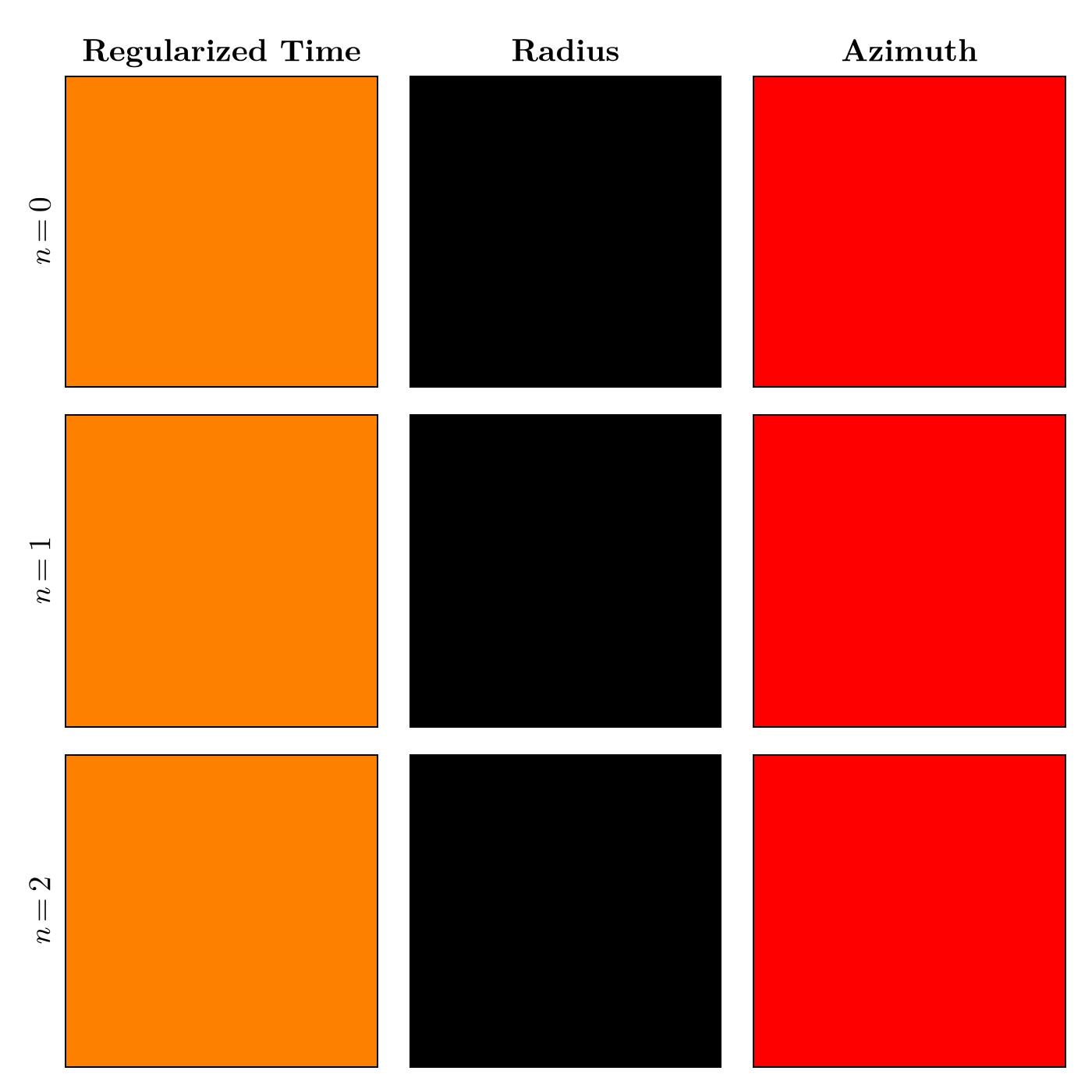Raytracing with inclination
In this example, we will raytrace the region around a Kerr blackhole as seen by an observer stationed at infinity. We will show the emission coordinates of the n=0 (direct) and n=1 (indirect) photons as they are emitted from the source, at a fixed inclination angle from the blackhole's spin axis.
First, let's import Krang and CairoMakie for plotting.
using Krang
using CairoMakie
curr_theme = Theme(
Axis = (
xticksvisible = false,
xticklabelsvisible = false,
yticksvisible = false,
yticklabelsvisible = false,
aspect=1
),
Heatmap = (
rasterize=true,
)
)
set_theme!(merge!(curr_theme, theme_latexfonts()))
metric = Krang.Kerr(0.99);
θo = 45 * π / 180;
sze = 400;
rmin = Krang.horizon(metric)
rmax = 10.0;
ρmax = 15.0;We will use a 0.99 spin Kerr blackhole viewed by an assymptotic observer at an inclination angle of θo=π/4. A region spanned by radii between the horizon and 20M at varying inclinations will be raytraced onto the 20Mx20M screen of the observer.
Create Figure
fig = Figure(resolution=(700, 700));
axes_list = [
[
Axis(fig[i, 1], title=(i==1 ? "Regularized Time" : ""), titlesize=20, ylabel=(i==1 ? L"n=0" : i==2 ? L"n=1" : L"n=2"), ylabelsize=20),
Axis(fig[i, 2], title=(i==1 ? "Radius" : ""), titlesize=20),
Axis(fig[i, 3], title=(i==1 ? "Azimuth" : ""), titlesize=20),
] for i in 1:3
]3-element Vector{Vector{Makie.Axis}}:
[Axis (0 plots), Axis (0 plots), Axis (0 plots)]
[Axis (0 plots), Axis (0 plots), Axis (0 plots)]
[Axis (0 plots), Axis (0 plots), Axis (0 plots)]Initialize Camera and Pre-Allocate Memory for data to be plotted
coordinates = (zeros(sze, sze) for _ in 1:3)
camera = Krang.SlowLightIntensityCamera(metric, θo, -ρmax, ρmax, -ρmax, ρmax, sze, A=Matrix);
material = Krang.CoordinatePoint();
colormaps = (:afmhot, :afmhot, :hsv)
colorrange = ((-20, 20), (0, rmax), (0, 2π))
store = Matrix{NTuple{4, Float64}}(undef, sze, sze)400×400 Matrix{NTuple{4, Float64}}:
(0.0, 0.0, 0.0, 0.0) (0.0, 0.0, 0.0, 0.0) … (0.0, 0.0, 0.0, 0.0)
(0.0, 0.0, 0.0, 0.0) (0.0, 0.0, 0.0, 0.0) (0.0, 0.0, 0.0, 0.0)
(0.0, 0.0, 0.0, 0.0) (0.0, 0.0, 0.0, 0.0) (0.0, 0.0, 0.0, 0.0)
(0.0, 0.0, 0.0, 0.0) (0.0, 0.0, 0.0, 0.0) (0.0, 0.0, 0.0, 0.0)
(0.0, 0.0, 0.0, 0.0) (0.0, 0.0, 0.0, 0.0) (0.0, 0.0, 0.0, 0.0)
(0.0, 0.0, 0.0, 0.0) (0.0, 0.0, 0.0, 0.0) … (0.0, 0.0, 0.0, 0.0)
(0.0, 0.0, 0.0, 0.0) (0.0, 0.0, 0.0, 0.0) (0.0, 0.0, 0.0, 0.0)
(0.0, 0.0, 0.0, 0.0) (0.0, 0.0, 0.0, 0.0) (0.0, 0.0, 0.0, 0.0)
(0.0, 0.0, 0.0, 0.0) (0.0, 0.0, 0.0, 0.0) (0.0, 0.0, 0.0, 0.0)
(0.0, 0.0, 0.0, 0.0) (0.0, 0.0, 0.0, 0.0) (0.0, 0.0, 0.0, 0.0)
⋮ ⋱
(0.0, 0.0, 0.0, 0.0) (0.0, 0.0, 0.0, 0.0) (0.0, 0.0, 0.0, 0.0)
(0.0, 0.0, 0.0, 0.0) (0.0, 0.0, 0.0, 0.0) (0.0, 0.0, 0.0, 0.0)
(0.0, 0.0, 0.0, 0.0) (0.0, 0.0, 0.0, 0.0) (0.0, 0.0, 0.0, 0.0)
(0.0, 0.0, 0.0, 0.0) (0.0, 0.0, 0.0, 0.0) (0.0, 0.0, 0.0, 0.0)
(0.0, 0.0, 0.0, 0.0) (0.0, 0.0, 0.0, 0.0) … (0.0, 0.0, 0.0, 0.0)
(0.0, 0.0, 0.0, 0.0) (0.0, 0.0, 0.0, 0.0) (0.0, 0.0, 0.0, 0.0)
(0.0, 0.0, 0.0, 0.0) (0.0, 0.0, 0.0, 0.0) (0.0, 0.0, 0.0, 0.0)
(0.0, 0.0, 0.0, 0.0) (0.0, 0.0, 0.0, 0.0) (0.0, 0.0, 0.0, 0.0)
(0.0, 0.0, 0.0, 0.0) (0.0, 0.0, 0.0, 0.0) (0.0, 0.0, 0.0, 0.0)Draw Function
function draw!(axes_list, store, camera, material, coordinates, rmin, rmax, θs)
times, radii, azimuths = coordinates
map(axes -> empty!.(axes), axes_list)
scenes = (Krang.Scene((Krang.Mesh(Krang.ConeGeometry(θs, (i, rmin, rmax)), material),)) for i in 0:2)
for (i,scene) in enumerate(scenes)
rendered_scene = Krang.render!(store, camera, scene)
for I in CartesianIndices(rendered_scene)
times[I] = rendered_scene[I][1]
radii[I] = rendered_scene[I][2]
azimuths[I] = rendered_scene[I][4]
end
coordinates = (times, radii, mod2pi.(azimuths ))
for j in 1:3
heatmap!(axes_list[i][j], coordinates[j], colormap = colormaps[j], colorrange=colorrange[j])
end
end
end
θs = π/40.7853981633974483Create the animation of Cone of Emission Coordinates
recording = CairoMakie.record(fig, "coordinate.gif", range(0.0, π, length=180), framerate=12) do θs
draw!(axes_list, store, camera, material, coordinates, rmin, rmax, θs)
end"coordinate.gif"
To use the GPU, by passing the appropriate array to the camera. and creating the appropriate store. for example:
using CUDA
store = CUDA.fill(0.0, sze, sze)
camera = Krang.SlowLightIntensityCamera(metric, θo, -ρmax, ρmax, -ρmax, ρmax, sze, A=CuArray)This page was generated using Literate.jl.